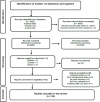The effect of COVID-19 on the mental health of the people in the Indian subcontinent: A scoping review
- PMID: 37692909
- PMCID: PMC10484499
- DOI: 10.3126/nje.v13i2.52766
The effect of COVID-19 on the mental health of the people in the Indian subcontinent: A scoping review
Abstract
Indian subcontinent has high mental heath burden and low resources to cope the mental health challenges. Assessment of impact of COVID-19 pandemic on the mental health would help to prioritize the resource allocations. We aimed to assess the impact of COVID-19 on the mental health of people in the Indian subcontinent. Following the PRISMA 2020 guideline, a scoping review was performed by systematically searching the PubMed, Scopus, and Embase databases to identify original studies that assessed mental health conditions during the COVID-19 pandemic in the Indian subcontinent. In this review, a total of 34 studies conducted between 2020 and 2022 were analyzed. The prevalence of anxiety disorders was found to range widely, from 2.5% in North Indian urban slum to 53% in Bangladesh and 21.7% in Pakistan. Similarly, the prevalence of depression varied widely, with rates ranging from 3.5% in North India to 29.8% in Pakistan. The prevalence of stress-related problems ranged from 18.3% in Pakistan to 59.7% in Bangladesh. Factors such as female gender, married status, healthcare workers, and mental illness were identified as important predictors of anxiety and depressive disorders. The impact of COVID-19 pandemic on mental health in Indian subcontinent varies widely based on study population and methods. Therefore, a cautious interpretation is needed while generalizing the study results.
Keywords: Anxiety; COVID-19; Depression; Indian subcontinent; Mental Health; pandemic.
© 2023 CEA& INEA.
Conflict of interest statement
Competing interests The authors declare no potential conflict of interests.
Figures
References
-
- World Health Organization (WHO). Pneumonia of unknown cause - China. [Online] 2020. Jan 5. Available from: https://www.who.int/emergencies/disease-outbreak-news/item/2020-DON229
-
- Wang C, Pan R, Wan X, et al. Immediate Psychological Responses and Associated Factors during the Initial Stage of the 2019 Coronavirus Disease (COVID-19) Epidemic among the General Population in China. Int J Environ Res Public Health. 2020. Mar 6;17(5):1729. https://doi.org/10.3390/ijerph17051729 10.3390/ijerph17051729 PMid: PMCid: - DOI - PMC - PubMed
-
- Roy D, Tripathy S, Kar SK, Sharma N, Verma SK, Kaushal V. Study of knowledge, attitude, anxiety & perceived mental healthcare need in Indian population during COVID-19 pandemic. Asian J Psychiatr. 2020;51:102083. https://doi.org/10.1016/j.ajp.2020.102083 10.1016/j.ajp.2020.102083 PMid: PMCid: - DOI - PMC - PubMed
-
- Burkova VN, Butovskaya ML, Randall AK, et al. Factors Associated With Highest Symptoms of Anxiety During COVID-19: Cross-Cultural Study of 23 Countries. Front Psychol. 2022;13:805586. https://doi.org/10.3389/fpsyg.2022.805586 10.3389/fpsyg.2022.805586 PMid: PMCid: - DOI - PMC - PubMed
-
- Torales J, O'Higgins M, Castaldelli-Maia JM, Ventriglio A. The outbreak of COVID-19 coronavirus and its impact on global mental health. Int J Soc Psychiatry. 2020. Jun;66(4):317-320. https://doi.org/10.1177/0020764020915212 10.1177/0020764020915212 PMid: - DOI - PubMed
Publication types
LinkOut - more resources
Full Text Sources

